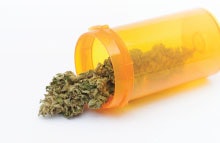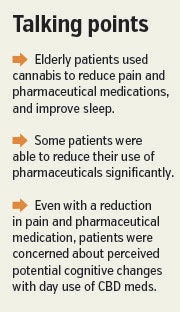
Malka gave a questionnaire to a select group of 12 elderly patients, aged 78 to 97, at a central California assisted living center in 2012. The patients had used cannabis-based medications for one to nine months at the time of the survey, which Malka, who runs a private practice, had recommended. The patients also used non-cannabis pharmaceuticals.
“What we found was [that] there were three main areas that these elderly patients used cannabis for, and that was for less pain, reduction of pharmaceutical medications and better sleep,” says Malka. She asked patients about the effectiveness of their cannabidiol medications, among other topics.
The most common pain reported was neuropathic pain and arthritis. The patients used high cannabidiol (CBD) medications, which are anti-inflammatories and muscle-relaxants, but don’t cause disorientation or other cognitive effects associated with tetrahydrocannabinol (THC), the psychoactive compound found in cannabis. The strain used most often by her patients had a 2-to-1 ratio of CBD to THC, often used in tincture form to regulate dosage. Among the strains in the study were Harlequin and Cannatonic, both CBD-rich with low THC.
Patients also applied the medication topically, or boiled the plant to make tea. A few patients opted for lozenges or cookies forms. Patients experimented with their own dosages, and some used very little, around a milligram per day. One patient used about 40 milligrams per day.
But the interesting thing is patients self-regulated their dosage with use over time, says Malka. Most of the patients self-titrated to about a 10 milligram dose per day, mostly using a glycerin-based tincture of about 3.5 milliliters—about a teaspoon.

That dosage was effective in reducing pharmaceutical medication for the patients as well. One patient went from five tablets of Vicodin daily to half a tablet, and another from 10 milligrams to 5 milligrams of Ambien daily. Another patient reduced Ativan dosage from 1 milligram daily to none.
The patients weren’t always able to completely eliminate non-CBD pharmaceuticals because they worried about potential cognitive affects from the cannabis-based medications. As Malka explains, “Many of them had a fear of daytime use, even though the CBD medication does not get you stoned.” Some patients only used topical CBD medication during the day, and then internal CBD medication at night. One patient wanted to use the medication to help with sleep, but wanted to use a CBD-rich medication, which does not cause drowsiness. He reported that the medication helped with pain during the day, but didn’t assist with his sleep problems.
If the patients used CBD-rich medication with low THC, they would not have that effect, says Malka. Sometimes, the traditional pharmaceuticals they continued using had their own side effects that do actually affect cognition.
At the assisted living community, a nurse manager checked in with patients daily, reassured them the CBD medication was safe to use, and modeled responsible and effective use. This helped to keep patients consistent in their usage, Malka says, as elderly patients can sometimes fall out of new routines when left on their own.
In feedback, patients said they weren’t certain how to quantify their dosage on their own, though all of them did find a dose that was effective for them over time. Another response was that too few suppliers carried high-CBD medication, which have proliferated in the time since the survey.
Malka would like to redo the study, with a federally approved source of medication, with a placebo study in the future.
Malka is the chair of education for the Society of Cannabis Clinicians, which provides information on effective medical cannabis use internationally.

















